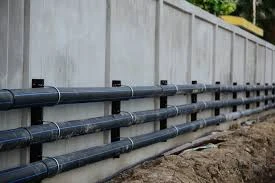Pro . 01, 2024 04:33 Back to list
High-Density Polyethylene Water Pipes and Their Advantages for Modern Plumbing Systems
The Importance of HDPE Water Pipes in Modern Infrastructure
High-Density Polyethylene (HDPE) pipes have emerged as a pivotal component in the construction and maintenance of water supply systems around the world. Due to their superior physical properties, durability, and cost-effectiveness, HDPE water pipes are becoming increasingly popular across various sectors, including municipal water systems, agricultural irrigation, industrial processes, and more. This article explores the characteristics, advantages, and applications of HDPE water pipes, emphasizing their significance in modern infrastructure.
Understanding HDPE and Its Properties
HDPE is a thermoplastic made from petroleum. Its molecular structure gives it unique characteristics that make it ideal for water piping applications. HDPE pipes exhibit excellent resistance to chemicals, corrosion, and environmental stress. They have a high tensile strength, allowing them to withstand varying water pressures without deforming. Additionally, their smooth inner surfaces minimize friction losses, ensuring efficient water flow and reducing the energy required for pumping.
One of the most notable properties of HDPE pipes is their flexibility. Unlike traditional materials such as PVC or metal, HDPE can be bent and shaped without losing structural integrity. This feature enables easier installation in challenging terrains and reduces the need for extensive fittings, subsequently lowering overall construction costs.
Environmental Impact and Sustainability
One of the most significant benefits of HDPE water pipes is their environmental friendliness. HDPE is fully recyclable and can be reused in the production of new pipes or other plastic products, promoting a circular economy. Moreover, the lightweight nature of HDPE reduces transportation and installation costs, leading to a lower carbon footprint compared to heavier materials.
HDPE pipes also contribute to water conservation efforts. Their leak-free joints and long lifespan minimize water loss through leaks, ensuring that precious resources are not wasted. This is particularly crucial in areas experiencing water scarcity, where every drop counts.
Applications in Various Sectors
hdpe water pipe

HDPE water pipes find applications in a multitude of sectors. In municipal water supply systems, they are used for distributing potable water, sewage systems, and stormwater management. Their resistance to rust and corrosion makes them a popular choice for water treatment plants and pumping stations.
In agriculture, HDPE pipes are extensively used for irrigation systems. Their flexibility and resistance to ultraviolet radiation ensure long-lasting performance in the field. Farmers can reliably distribute water to crops, improving yield and efficiency in water usage.
Moreover, the industrial sector utilizes HDPE pipes for transporting chemicals and wastewater. Their ability to withstand harsh chemicals and high temperatures makes them suitable for various applications in chemical processing and waste management facilities. The reliability of HDPE pipes reduces maintenance costs, allowing industries to focus resources on core operations.
Installing HDPE Water Pipes Best Practices
The installation of HDPE pipes requires careful planning and adherence to best practices to ensure optimal performance. Key factors include selecting the appropriate diameter and pressure rating for the application, as well as using proper joining techniques, such as heat fusion or electrofusion, to create robust and leak-free connections.
Before installing HDPE pipes, conducting a thorough site assessment is essential to identify any potential obstacles and to plan for adequate trenching. Proper bedding materials should be used to support the pipes and minimize settlement. It's also crucial to ensure that pipes are protected from extreme temperature variations that could cause thermal expansion or contraction.
Conclusion
High-Density Polyethylene water pipes play a vital role in modern infrastructure, offering a combination of durability, flexibility, and sustainability. Their benefits extend across multiple sectors, enhancing the efficiency of water distribution, agricultural irrigation, and industrial processes. As communities and industries continue to seek innovative solutions for water management and conservation, the popularity of HDPE pipes is expected to grow. Their ability to provide reliable, environmentally friendly, and cost-effective solutions positions them as a fundamental element in the future of water infrastructure. With ongoing advancements in material technology and installation techniques, HDPE pipes will undoubtedly remain at the forefront of efforts to build resilient and efficient water supply systems worldwide.
-
High-Quality HDPE Sheet | Durable Plastic Panels
NewsAug.06,2025
-
High-Precision PVC Rigid Sheets for Vacuum Forming | AI-Optimized
NewsAug.05,2025
-
Durable PVC-M Water Supply Pipes | 60-Year Life
NewsAug.04,2025
-
Premium HDPE Water Supply Pipes: Durable & Leak-Proof
NewsAug.03,2025
-
Premium PVC-M Water Supply Pipe - Durable & Efficient
NewsAug.02,2025
-
HDPE Drainage & Irrigation Pipe - Durable, Efficient Solutions
NewsAug.01,2025

